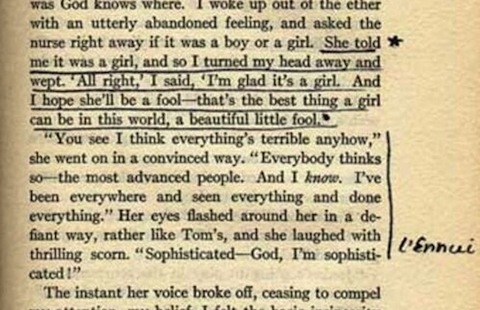
The true fan of a writer desires not just that writer’s complete works, even if they all come signed and in first editions. No — the enthusiast most dedicated to their literary luminary of choice must have, in addition, the books written by that author, those owned by that author, preferably anointed with liberal quantities of revealing marginalia. In the case of such relatively recently deceased writers as David Markson, the whole of whose well-annotated personal library got donated to The Strand shortly after his passing, you can sometimes actually come to possess such treasures. In the case of poet Sylvia Plath, part of a page of whose copy of F. Scott Fitzgerald’s The Great Gatsby you see above, you might have a trickier time getting your hands on them. Justin Ray’s post at Complex, which quotes Plath as calling Fitzgerald “a word painter with a vivid palette” who chooses words with “jewel-cut precision,” has more on the book and its markings.
“Plath studied a crap-ton of literature in school,” Ray writes. “It isn’t immediately clear whether she was in high school or college when she annotated Gatsby,” but whenever she did it, she underlined “Daisy’s prediction of what her daughter will be like” with the word “L’Ennui,” a word she would use to name an early poem that reflects “a post romanticism and the death of idealism, two ideas also in Gatsby, according to an essay by Anna Journey.” Elsewhere, you can also read “Princess Daisy,” Park Bucker’s piece on Plath’s annotated Gatsby. “The volume represents a fascinating piece of evidence of Fitzgerald’s rising reputation and influence in the early 1950s, as well as the academic background and tastes of a major American poet,” writes Bucker. “Although Sylvia Plath and F. Scott Fitzgerald rarely inhabit the same sentence, their association should not appear strained. A young, intense poet would naturally be drawn to the lyric quality of Fitzgerald’s prose.” And just imagine its value to die-hard fans of both of those tragic pillars of American letters — a group in which, if you’ve read this post and everything to which it links, you should perhaps consider counting yourself.
Related Content:
Hear Sylvia Plath Read Fifteen Poems From Her Final Collection, Ariel, in 1962 Recording
Haruki Murakami Translates The Great Gatsby, the Novel That Influenced Him Most
83 Years of Great Gatsby Book Cover Designs: A Photo Gallery
Read F. Scott Fitzgerald’s Great Gatsby & Other Major Works Free Online
Gertrude Stein Sends a “Review” of The Great Gatsby to F. Scott Fitzgerald (1925)
Colin Marshall hosts and produces Notebook on Cities and Culture and writes essays on cities, language, Asia, and men’s style. He’s at work on a book about Los Angeles, A Los Angeles Primer. Follow him on Twitter at @colinmarshall or on Facebook.


Leave a Reply